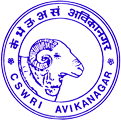Central Sheep and Wool Research Institute
Central Sheep and Wool Research Institute (CSWRI) is a premier institution in India dedicated to research and development in the field of sheep and wool production. Established in 1962, the institute plays a pivotal role in enhancing the quality and productivity of sheep and wool through innovative research, technology transfer, and improved management practices.
Overview[edit | edit source]
The Central Sheep and Wool Research Institute is located in Avikanagar, Rajasthan, with regional stations in different parts of India to cater to the diverse agro-climatic conditions affecting sheep farming. The institute operates under the aegis of the Indian Council of Agricultural Research (ICAR), Ministry of Agriculture, Government of India. Its primary focus is on improving the genetic stock of sheep, enhancing wool quality, and developing sustainable sheep farming practices that are both economically viable and environmentally friendly.
Research and Development[edit | edit source]
CSWRI conducts multidisciplinary research in areas such as genetics and breeding, nutrition, health management, and socio-economic aspects of sheep farming. The institute has made significant contributions to the development of high-yielding sheep breeds, including the development of improved breeds like Avikalin and Malpura, which are well adapted to Indian conditions.
Genetics and Breeding[edit | edit source]
The institute's genetics and breeding program focuses on the development of sheep breeds with superior wool quality, higher meat production, and improved reproductive efficiency. Through selective breeding, genetic improvement programs, and the use of biotechnological tools, CSWRI aims to enhance the genetic potential of Indian sheep breeds.
Nutrition[edit | edit source]
Research in nutrition at CSWRI includes the development of cost-effective feeding strategies that ensure the optimal growth and health of sheep. The institute works on formulating balanced diets using locally available feed resources, improving pasture management, and studying the nutritional requirements of sheep at different stages of growth.
Health Management[edit | edit source]
The health management research at CSWRI encompasses the prevention and control of infectious and non-infectious diseases affecting sheep. The institute develops vaccines, diagnostic tools, and effective treatment protocols to manage diseases and improve the overall health and productivity of the sheep population.
Socio-Economic Research[edit | edit source]
CSWRI also undertakes socio-economic research to assess the impact of sheep farming on the livelihoods of farmers. This includes studies on market trends, the economic viability of sheep farming, and the development of strategies to enhance the income of sheep farmers through value-added products.
Extension and Training[edit | edit source]
The institute plays a crucial role in the dissemination of knowledge and technologies developed through its research activities. It conducts training programs, workshops, and field demonstrations for farmers, extension workers, and students to promote improved sheep farming practices. CSWRI also publishes technical bulletins, manuals, and research papers to reach a wider audience.
Facilities[edit | edit source]
CSWRI is equipped with state-of-the-art laboratories, experimental farms, and a modern infrastructure to support its research and development activities. The institute's facilities enable scientists to conduct comprehensive studies on sheep genetics, nutrition, health, and management.
Conclusion[edit | edit source]
The Central Sheep and Wool Research Institute remains at the forefront of sheep and wool research in India. Through its dedicated efforts, CSWRI contributes significantly to the growth and sustainability of the sheep farming industry, ensuring food security and improving the livelihoods of farmers across the country.
Search WikiMD
Ad.Tired of being Overweight? Try W8MD's physician weight loss program.
Semaglutide (Ozempic / Wegovy and Tirzepatide (Mounjaro / Zepbound) available.
Advertise on WikiMD
|
WikiMD's Wellness Encyclopedia |
| Let Food Be Thy Medicine Medicine Thy Food - Hippocrates |
Translate this page: - East Asian
中文,
日本,
한국어,
South Asian
हिन्दी,
தமிழ்,
తెలుగు,
Urdu,
ಕನ್ನಡ,
Southeast Asian
Indonesian,
Vietnamese,
Thai,
မြန်မာဘာသာ,
বাংলা
European
español,
Deutsch,
français,
Greek,
português do Brasil,
polski,
română,
русский,
Nederlands,
norsk,
svenska,
suomi,
Italian
Middle Eastern & African
عربى,
Turkish,
Persian,
Hebrew,
Afrikaans,
isiZulu,
Kiswahili,
Other
Bulgarian,
Hungarian,
Czech,
Swedish,
മലയാളം,
मराठी,
ਪੰਜਾਬੀ,
ગુજરાતી,
Portuguese,
Ukrainian
Medical Disclaimer: WikiMD is not a substitute for professional medical advice. The information on WikiMD is provided as an information resource only, may be incorrect, outdated or misleading, and is not to be used or relied on for any diagnostic or treatment purposes. Please consult your health care provider before making any healthcare decisions or for guidance about a specific medical condition. WikiMD expressly disclaims responsibility, and shall have no liability, for any damages, loss, injury, or liability whatsoever suffered as a result of your reliance on the information contained in this site. By visiting this site you agree to the foregoing terms and conditions, which may from time to time be changed or supplemented by WikiMD. If you do not agree to the foregoing terms and conditions, you should not enter or use this site. See full disclaimer.
Credits:Most images are courtesy of Wikimedia commons, and templates Wikipedia, licensed under CC BY SA or similar.
Contributors: Prab R. Tumpati, MD

